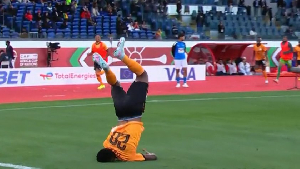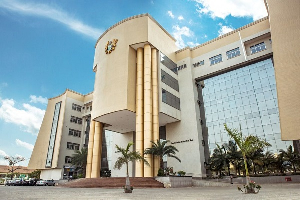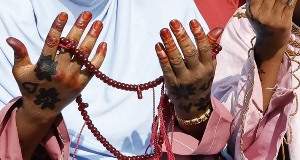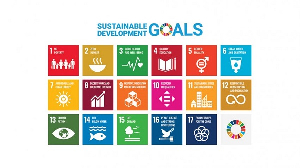.... is Sustainable Development Feasible?
Ghana like any developing country of today has over the years, experienced several fortune-altering happenings numerous enough to have turned the socio-economic kismets of this country round; talking about the ever increasing human resource base, technological advancement, the continuous discovery of different kinds of natural resources (ranging from nickel to oil) and many other accomplishments deemed, by the international administrative bodies and many other development oriented establishments, necessary for the complete transformation of the socio-economic lives of the masses of any striving economy of her sort. With these, the question one is therefore prompted to ask is, ‘In the midst of these, why are the majority peasants of this country still wallowing in poverty and languishing in the merciless hands of hunger?’ and the answer to this paradoxical question is not improbable. It is simply because politics has taken the better part of the ordinary Ghanaian. Even more ironical is the fact that the ordinary poor folk of this country gripped in the shackles of this seemingly unending poverty seems to know the rules to this game of political segregation better and more married to it than the government official who reaps the direct and fresh fruits of it. It is therefore nothing but the overemphasis on political ideologies as varying as they might always be, which has being the major encumbrance in the possible reflection of the comforting shadows of these numerous socio-economic and natural endowments of the country on the ordinary Ghanaian. The effect of this political ideological inconsistencies has always being the suspended policies and programmes, the delayed or sometimes abandoned projects such as the uncompleted bridges, the halfway-built gutters and the numerous electricity cables lying idle in our communities for decades and being stolen by private individuals for their selfish interest just to mention but a few. Taking into consideration, the numerous abandoned projects by successive governments from independence up to date, simply because of shift in political ideological focus, it has proven that it is not far from right for one to say we are the cause of our own woes of today. According to former UN secretary general, this negative aspect of politics locally referred to as the “pull-him-down” (PHD) syndrome needs to be discarded to promote development. He said the situation was a disincentive to development efforts and should be discarded when he was speaking on Thursday October 21 at a dinner hosted by the Asantehene, Otumfuo Osei Tutu II, in honor of the visiting UN Foundation Board of Directors, at the Manhyia Palace.
Unfortunately this situation has rooted itself firmly on the Ghanaian soil, fertilized and nurtured by our own political egotistical interests and fueled by partisan accusations and counter accusations in the media and other related platforms in our poise to score political points to an extent it seems to be only providence’s intervention that can rid this nation of it.
The present state of affairs and the role of the individual
Though the situation seems to be improving over the years much still needs to be done. With respect to the current administration, several projects initiated by the previous administration are being pursued and others even upgraded to be in a better position to benefit the ordinary Ghanaian. For instance the turning of the Rural Enterprise Project (REP) in to a National Enterprise Project came as soothing news to every Ghanaian who is concerned about the sustainable development of this country and this sends a strong signal to the world that, it is the good of the country that matters and not political malice. Other initiatives worth of mention include the continuation of the Metro Mass Transport System, the School Feeding Program, the capitation grant, the NHIS, continuation of the Tamale Teaching Hospital, the construction of the Bole-Bamboi road and many others which give this current government an excellent icon and a clear quintessence of political unification and no evenhanded Ghanaian will disparage this government for such if not laud it, despise our different political shades. This notwithstanding, the delay, if not abandonment, of certain high profiled projects of this country initiated by previous administrations which took billions of cedis and other resource commitments is giving a sense of worry to the ordinary Ghanaian. Prominent among these projects which are worthy of consideration are the Aveyime Rice Project, initiated by the then NDC government to save this country the millions of cedis that go into rice importation every year and its negative consequences on GDP, which has not received the needed attention for it to achieve it intended purpose. In 2009 the then Minister of Food and Agriculture Mr Kwesi Ahwoi, said the government was committed to seeing the Aveyime Rice Project flourish when he visited the Aveyime Rice Project and met staff and management of Prairie Volta Limited of the USA which owns 40 percent shares in the project. He said the viability of the project, with the capacity to largely reduce the 450 million dollars annual rice import, had never been in doubt. Yet up to date this project seems not to have attained the needed capacity to realize its intended purpose. Another developmental issue worth of mention is the analogous housing deals contracted by the just previous and current administrations of this country putting the ordinary Ghanaian into a state of complete perplexity and bewilderment. The Affordable Housing Project initiated by the previous government seems to be given little attention than required. Meanwhile, According to the Ghanaian Chronicle of 16th July 2010, the then Deputy Minister of Water Resources, Works and Housing, Dr. Mustapha Ahmed, gave a strong assurance of the government's intention to complete the Affordable Housing Project started by the past New Patriotic Party (NPP) government across the regions of Ghana on his working visit to the Wamale Affordable Housing Project site in the Northern Region. This came as welcoming news to the development-concerned Ghanaian as it would have being one of the remarkable steps of our political ideological harmony, but the pace of materialization of this affirmation seems to be sluggishly non-progressive and the situation seems to be in no way improving as the 2011 budget seems not to give a very constructive strategy by which the project will be completed. This very housing deals initiated so far affirms this political ideological as the various minorities of as at their times of initiation kicked against the deals were never heeded to. What this has signaled to the ordinary Ghanaian is that, should the current administration leaves power without completing the newly contracted STX Korea housing deal, it is likely to be unnecessarily delayed or even abandoned by any subsequent prospective government and more especially if it happens to be the current opposition NPP. What is therefore worth noting is that, the final consequence of such inconsistencies is the continual borrowing from international bodies and their subsequent effect of indebtedness which continuously bedevils the economy with retardation in growth.
Yet, what seems to be of no less worth of mention is the current political educational blunder that has bedeviled the senior high school system as a result of inconsistent political ideals. The current hostile conditions of students having to walk over long and unacceptable distances to schools and others sleeping in class rooms for lack of space for accommodation should, by this time, have sent a strong signal to our political leaders that it is not every sector of the economy that can be tampered with politically. It should therefore be noted that some sectors are very delicate and their twist in any way must be given the needed perusal and justification devoid of any parochial political interest before such twirl is undertaken or the masses be put into snag.
One thing that should be noted earnestly, at this point in time is that, all these stated so far have their final effects boiling down to the ordinary Ghanaian with the well able political gurus going impervious after all when two elephants are in a fight it is the ground that suffers.
It is sometimes however not very baffling to find such things happening in our political quarter of this country as political parties become highly circumspect in the completion of such projects by their predecessors of other sides of the political divide simply because they feel this will add to the political points of their opponents by making them popular and hence creating their (the latter) own dawn fall. This sounds, to a very large extend, true because the ordinary Ghanaian is easily convinced on such feeble grounds and hence perpetrating this canker. But the truth on the ground is that if this is not given the needed attention and consequently averted, the country will continue to rock back and forth in development in our pursuit of political notoriety. It therefore takes the right attitude of the ordinary Ghanaian to avert this situation as we hunt for the best for this country. The ordinary Ghanaian has a major role to play to alter this resource-draining situation in our poise to turn the fortunes of this country round. Let us know that even in our political staunchness the good of our country is what is paramount and benefitting to the general poor and should therefore remain core and not political seizure of power. It is therefore very profitable for all of us and for our country as a whole to begin making strong and very objective judgments no matter our political standing about who is really for the good of this country and who is for the good of a political party. It should therefore be noted that whichever political party that goes on its campaign grounds, the media or any related platform to heckle any political party on basis of the continuation of its projects should not be seen as the right political party for this country because it is not into the good of the people.
The constitution, Political Party manifestoes and the role of the NDPC (The way forward)
Let it be emphasized, with all earnestness, that the golden opportunity of this current constitutional review exercise has to take into somber consideration the urgent need for not only an absolutely independent National Development Planning Commission (NDPC) but also consider the need to stipulate a new article in the constitution which will compel all political parties to make their manifestoes in complete consonance with the National Development Policy Frameworks (both medium and long term) subject to the scrutiny and approval of the NDPC before they are used as legal political working document. And that any political party which defies this constitutional provision is not qualified to contest in the election. This will go to buttress the already existing but little-adhered-to Article 35 clause 7 of the 1992 constitution of Ghana which feebly states that Governments shall continue to execute projects and programmes commenced by the previous administration. This will also bring harmony in political ideologies and ideals because the problem is being tackled at the primary (party) level. It is believed that should this be done political parties will be compelled to work along a single direction of development and change (NDPF) in their poise to fulfill their campaign promises in their political party manifestoes. This will not only bring about the purge of abandonment of projects but will bring about an attitudinal change of the usual saying, ‘we initiated and you continued’ on political campaign platforms as this will be regarded illegal, unconstitutional and subject to chastisement. Projects will also become more nationally oriented in the view of the general population than politically inclined. This therefore calls for a more enhancement of the NDPC and other related government departments such as the Ministry of Finance and Economic Planning in terms of logistics and personnel to help them carry on their shoulders this herculean task of given the country a sense of national direction in all sectors of the economy.
Conclusion
All in all the time for us to make a remarkable shift to avert this social canker is now and no little effort should be relented in fighting for the best for this noble country. It should be noted that if the problem is not tackled now it has futuristic generational implications which will not allow this country to grow to its deemed status. Let us therefore be admonished that, to save our country the repercussions of the struggle among regimes and make sustainable development feasible, there is the urgent need to give a strong legal backing to the brawl.
The author, Solomon Anzagra is in the Department of planning. Kwame Nkrumah University of Science and Technology – Kumasi, Ghana
[email: sanzagra@yahoo.com]














